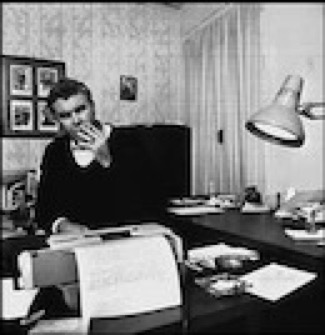Raymond Carver
Literary Critique - What We Talk About When We Talk About Love
September/17/2016 10:00 AM Filed: Literary Critiques

Photo Credit: Unknown
(Goodreads)
An Unromantic Epiphany
In Raymond Carver’s 1981 story, “What We Talk About When We Talk About Love,” a group of friends discuss domestic violence and the meaning of love over gin and tonic.
The most significant character is Terri, a woman deluded into believing her ex-boyfriend beat her because he loved her. Rather than behaving as a victim and accusing the abuser of harming her, she condones his actions in the mistaken notion that the more passionate the relationship, the rougher the lover.
Terri’s husband remarks, “Terri’s a romantic. Terri’s of the kick-me-so-I’ll-know-you-love-me-school.”
Carver may not have wanted to induce laughter when he created this sidekick of a spouse, but these two characters bounce dialogue off each other in a deadpan, humorous delivery. Eventually, her destructive ex committed suicide. “It was love,” Terri said. “Sure, it’s abnormal in most people’s eyes. But he was willing to die for it. He did die for it.”
Terri exhibits masochistic tendencies and cannot accept the reality that hatred is associated with physical abuse, not love. Perhaps she adored her ex-boyfriend and couldn’t handle his possessiveness outbursts without rationalizing.
Literary Critique - Cathedral
June/02/2016 03:13 PM Filed: Literary Critiques

Photo Credit: Unknown
(Wikimedia Commons)
Drugged Illusion and Alternate Reality
In Raymond Carver’s “Cathedral” the use of drugs by the male protagonist signifies his need to find another reality, one easier to tolerate. This character is subjected to backseat positioning while his wife asserts autonomy within the marriage.
The shoved aside husband and narrator in Carver’s story encourages the use of marijuana to achieve an altered perception of the world. Although some may attribute this behavior to mere experimentation and nothing more, his offering the joint to his wife and her blind friend is an attempt to control the situation through the subtle dominance of a drug. He feels shunned and resents not being the center of attention as his wife’s companion steals the show.
Early in the story he expresses irritation over a poem she wrote about an experience with her friend. “In the poem, she talked about what she had felt at the time, about what went through her mind when the blind man touched her nose and lips. I can remember I didn’t think much of the poem.”
Later his annoyance manifests itself in marijuana use. In this instance, the protagonist reaches for an illusive balm to heal the pain of his present reality. Unhealthy escape is an unfortunate part of contemporary culture.